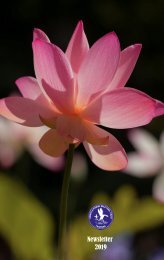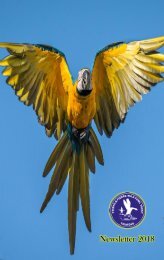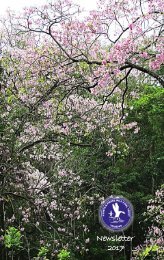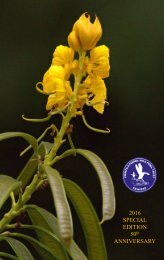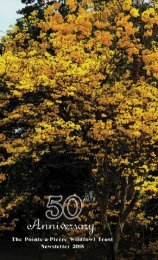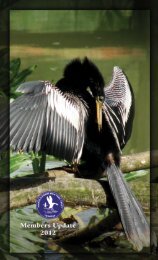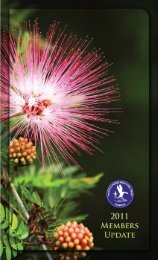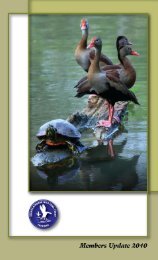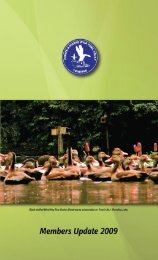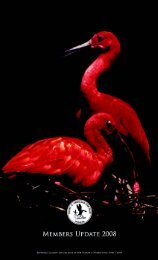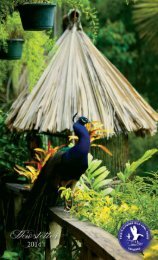Newsletter 2020
Create successful ePaper yourself
Turn your PDF publications into a flip-book with our unique Google optimized e-Paper software.
Newsletter
2020
To Our Members, Friends and Well Wishers
The Pointe-a-Pierre Wildfowl Trust would like to THANK ALL OF YOU who support the work that we do! The
year 2020 has indeed been a trial for US ALL! YOUR TRUST IS NOT CLOSED.
Due to the global pandemic caused by the Corona Virus/ Covid 19 and in compliance with the Ministry of Health’s
guidelines and the Law, the Trust must now for the safety of EVERYONE reduce the amount of visitors at one
time and to ask members to come in small groups, as per Ministry’s guidelines.
Approaching 2021, the Trust will be celebrating its 55 th Anniversary and we pray and hope that in this coming year
this pandemic will be over and we can celebrate our milestone with you!
We continue to forge ahead with our mission of Environmental Education and Public Awareness to our nationals
and most importantly OUR YOUTH. The Trust believes that only through perseverance and dedication can we
overcome all the challenges that the Pandemic has brought upon us, in order to move forward.
As we adapt to the new normal, we hope that as you come to us for visits and Nature Walks and our Environmental
Education Programmes, that everyone will continue to adhere to ALL SAFETY PROCEDURES NECESSARY TO
KEEP ALL OF US SAFE AND ALIVE!
The Pointe-a-Pierre Wild Fowl Trust
C/o #38, La Reine Town House, Flagstaff Hill,
Long Circular Road,
St. James.
Trinidad West Indies
Telephone:612-2463 ext. 2512# Website: www.papwildfowltrust.org
Please visit our YouTube Channel for Further Information on the Trust
Email: wildfowltrust@gmail.com
Telephone: 658-5322
Trust’s Nature Retreat and Guest House
Petrea Place and Freebird Restaurant
Email: r.squared2events@gmail.com
1
The Pointe-a-Pierre Wildfowl Trust
1966- 2020
2
3
P-a-P Wildfowl Trust attends Climate Change Conference
In November, 2019 The Ministry of
Planning and Development hosted
consultation talks for the updating
of the National Climate Change
Policy. Various organisations and
NGOs were invited including the
Trust’s Educators Jaleen West and
Silene Noel.
UWI’s Institute of International
Relations hosts Diplomatic
Dialogue
The Diplomatic Dialogue explored the possibility of Clean
Energy in the Caribbean. Germany has been one of the
leading countries to accomplish this goal. Mr. Haack
advised the necessary steps that need to be taken to attain
this efficiently through ensuring Reliability, Affordability
and Environment Sustainability.
The Pointe-a-Pierre Wildfowl Trust’s Management and Staff at
the Institute of International Relations at UWI for their
Diplomatic Dialogue on Climate Change.
Featured Speaker, Andreas Haack, Charge
d'affaires/ Deputy Ambassador from the
Embassy for the Federal Republic of Germany
in Trinidad.
4
Marabella North Secondary School Career Day
Senior Education Officer, Marilyn
Hinkson attended a Career day at the
Marabella North Secondary School.
Students were enlightened on the
aspect of a career in the
Environmental Field and all the
rewards it can bring. As well as all
the issues that needs to be addresses
and corrected in our world.
Left: Thank you carded signed by
students and staff for participating in
their Career Day.
Ms. Marilyn Hinkson, Snr Educator for the Trust chatting with a
staff member at the P-a-P Wildfowl Trust’s display booth for the
school’s Career Day
Students observe and read and
publications given to them about the
Trust and the work that we do.
The Trust’s Secondary School
Environmental Education Programme
Lower Secondary: Ages 13-15
Form 1– 3
Appreciation for Nature, Caring for the Environment, Basic Conservation and Preservation, Man and His
Environment, Linkages and Values. Activities hiking, observations of characteristics of plants, tree, animals and
the environment.
Upper Secondary: Age 16– 18 years
Form 4– Upper 6
5
The R’s for the Sustainability of the Environment. Advanced approaches to Conservation and Preservation,
Biodiversity, Value and Linkages. Activities: Ecology Lab (Vegetation Sampling, Aquatic Sampling), Climate
Change Talks, In-situ and Ex-situ.
We also facilitate Tertiary Groups of different disciplines for fields of study/ research.
Retirees at Large
visit Wildfowl
Trust
Relaxing on benches at the end of our boardwalk, overlooking the
Trust’s Main Breeding Lake.
Observing the water-resistant texture of
the Lotus Lily leaf, this is similar to
Dasheen Bush Leaf.
Retirees at large is a group comprised of several retirees, ladies and gentlemen, from the University of the West
Indies (UWI) , Hugh Wooding Law School, St Augustine, and from different walks of life. The retirees visited the
Point- a – Pierre Wild Fowl Trust to enjoy the peace and beauty of the area. The very enthusiastic members were
impressed and very interested in the trust’s environmental education programmes which also include the tasting of
local fruits and flowers found at the nature reserve and the discussions and exchange of information about their
different medicinal and health values. The retirees also enjoyed the view of the trust’s, main breeding lake at the end
of the new boardwalk for the differently-abled was commissioned by the President Paula- Mae Weeks who is the
patron of the trust. In a media release the Wildfowl Trust said it gives everyone- the young, the mature and the
differently- abled- a chance to experience the joy and healing power that nature brings.
Petrea Place Guest House, Nature
Retreat and Freebird Restaurant,
Wildfowl Trust. P-a-P
Visit of Her Excellency Paula- Mae
Weekes, President of the Republic
of Trinidad and Tobago to the P-a-P
Wildfowl Trust
Petrea Place is a unique facility, a full service guest house
and restaurant that makes our guests and visitors feel at
home and comfortable while offering quiet and harmonious
surroundings conducive to complete relaxation.
At the moment, due to Covid 19, indoor dinning is closed,
however, Delivery and Pick- Up is available of menus varied
weekly.
The President of the Republic of Trinidad and
Tobago, H.E. Paula-Mae Weekes visited the Trust.
As the Honorary Patron of the Pointe-a-Pierre
Wildfowl Trust, H.E. observed first- hand the
implementation of some of the Trust’s hands-on
programmes gaining information on the many
aspects of the Trust’s wide portfolio of
Environmental and Public Awareness work with
students, teachers, Brownies, Guides, Scouts,
Community Organizations and the differentlyabled.
H.E. was also pleased to receive in-depth
information on the Trust’s breeding and release
programmes of Trinidad and Tobago’s endangered
wetland waterfowl and other birds like our National
bird, the Scarlet Ibis.
6
World Wetlands Day!
Wetlands & Biodiversity
Students from St Katherine's Private Primary visit the P-a-P WFT in celebration of World Wetlands Day Early
2020.
Audrey Jeffers School for the Deaf pupils express their
love for Nature and Biodiversity at the P-a-P WFT,
participating in the Trust’s special environmental
therapy programme.
Teacher signs for pupils of the Audrey Jeffer’s School
for the Deaf as Trust Educator Silene Noel talks
about Trinidad's National Bird, the Scarlet Ibis.
Air Quality, Students test
the air pH of the PaPWFT
during our celebrations
for World Wetlands Day
2020
7
Biodiversity, Wetlands and Ecology! Students
perform a pond dip to identify organisms that live
in the Trust's Lake
Ecology Study, Students from
Providence Girls' Catholic
School test the pH of the soil
at the PaPWFT
8
Some
Medicinal Plants
CHADON BENI ,
BANDHANIA
Eryngium foetidum
Leaf of tea for diabetes.
Root decoctions for
fever, cold , cough ,
convulsions. Oil herb is
anti- spasmodic. Plant
shows anti- malarial
activity.
DOUBLE HIBISCUS
Hibiscus rosa-sinensis
Decoctions of flowers for flu ,
heavy chest coughs ,difficult
menstruation. Poultice of leaves
for hernia. Flowers can be eaten
raw to aid digestion. Boiled root
for venereal diseases.
BOIS CANOT
Cecropia peltana
Dry leaf steeped
in hot water for
cough, chest
colds. Leaves and
bark for asthma.
Green leaves for
kidney disorders.
Latex (juice) from
bark and root for
snake and
scorpion or
centipede bites.
TI MARIE
Mimosa pudica
Stem and root for whooping cough. Root is boiled for
passage of urine. Leaf and root extract are anti- bacterial.
Formerly used with other plants for gonorrhoea and as a
poison antidote.
BAMBOO
Bambusa vulgaris
Root tea as a purgative. Leaf tea for
fevers, flu and pneumonia.
WILD SAGE
Lantanta camara
Tea for colds and fevers.
Has lantarine , which has
action similar to quinine.
Also attracts many
butterflies.
CASHEW
Anacardium occidentale
Leaf tea for indigestion; useful in stomach
disorders. Bark tea for diarrhea. Flowers for
cough. Fruit of young leaves for bleeding
gum , sores in the mouth . Juice of nut is an
iodine , substitute; anti- bacterial.
NUTMEG
Myristica fragrans
Nutmeg is said to have aphrodisiac properties. Grated seed and / or mace is used as a stimulant to expel gas,
for constipation and to stop external bleeding. Whole seed steeped in hot water for asthma. Grated seed for
malaria pneumonia; for women in labour to ease pain, to help passage of baby during delivery. Mixed with
mother’s milk it is given to a child for gripe. A tea made from the leaves and mace, for cough and chest
colds. Grated seed can be added to liquid tonics. Nutmeg flavors milk dishes cakes and punches. Mace
flavors savoury dishes, pickles and is used as cakes and punches. Mace makes a delicious tea. A piece of
nutmeg is left in the mouth to prevent strokes. Add mace to brandy , use a little as a tonic.
WETLANDS AND HUMAN HEALTH
Healthy Wetlands, Healthy People
The Ramsar Convention on Wetlands defines a “wetland” as an area where water is the primary factor
controlling the environment and the associated plant and animal life. Wetlands occur where the water
table is at or near the surface of the land, or where the land is covered by water.
Wetlands can have flowing or static water, they can be natural or artificial (man-made) and the water
can be fresh, brackish or salt. A wetland can even be an area of marine water, where at low- tide the
water does not exceed six meters.
Wetlands ecosystem diversity is quite variable. Wetlands greatly contribute to the world’s biodiversity.
They serve as a habitat for many species of amphibians, fish, invertebrates, birds, reptiles and
mammals. They also serve as important storehouses for plan genetic material. Wetlands provide
enormous socioeconomic and ecological values for humanity, by offering water supplies, fisheries
(over two thirds of the world’s fish harvest are linked to coastal and inland wetlands), wildlife
resources, recreational usage and tourism.
Wetlands provide many ecological services for societies. This includes but is not limited to health
services. They have direct and indirect benefits to man’s health.
1. Access to sufficient safe water - They provide an adequate quantity and quality of water. This
prevents dehydration and poor hygiene.
2. Water purification and detoxification of waste. They absorb nitrates from urban developments
in their soils. Wastes materials are greatly reduced before entering marine ecosystems. This is
why wetlands are called the earth’s kidneys. They prevent exposure to harmful toxins.
3. Nutrients – Wetland ecosystems provide invertebrate and fish which serve as protein sources for
communities. This prevents micronutrient deficits, obesity and diabetes.
4. Socioeconomic security- Wetlands provide jobs in fisheries for many persons. They provide
financial resources for persons in low-income settings to attain needed health care.
5. Mitigation of climate change impacts – Mangrove wetlands and floodplains buffer the harmful
effects storm surges and sea level rise. These events can lead to loss of life, trauma and
destruction of property.
6. Mental health – Healthy wetlands provide environments for culture sharing, ecotourism,
sporting events and fisheries. These services all offer relaxation to tourists and residents.
7. Access to medications – Many indigenous communities use plants from wetlands environments
in their medicines. The biodiversity in wetlands has also significantly contributed to the
pharmaceutical industry.
We must preserve and protect our wetlands. The Pointe-a-Pierre Wild Fowl Trust has worked and
championed the cause for wetland conservation and restoration for many years. Through our
education program at the Trust (which is a wetland!) and our school trips to multiple coastal
wetlands, we aim to share knowledge and passion on wetland services and values.
Together, we must strive to protect our natural resources, not only for our use, but the sustainable
and safe use for future generations.
Maurice Frank, DVM
CARPHA (The Caribbean Public Health Agency)
Volunteer at The Pointe-a-Pierre Wildfowl Trust
9
Volunteers
Students from MIC Institute of Technology spent a rewarding day at the Trust early this year, giving their time and
energy by volunteering. These young men helped do repairs around the Trust as well as upkeep the aesthetics of
the area.
TV 6 Visits the Trust
Commemorating World
Wetlands Day, the TV6
team showcased a
segment on the
importance of Agouti’s
and their role in the
Forest. News Reporter
Seigonie Mohammed
and her team visited the
Trust to capture footage
on the Trust’s Hiking
Trails where Agoutis
are usually sighted for
this segment.
News Reporter Seigonie Mohammed
and her team on one of the Trust’s
three hiking trails.
Seigonie shows off a ‘Devil’s Ear’ found on
Forest Walk, The Trust’s Interpretative Trail
for Forest trees.
On Set: The Trust’s very
own Environmental
Educator, Jaleen West
joins the TV6 News
Crew for a special
interview. Presenting
numerous plants and
fruits that can be used
for medicine and sharing
information with the
wider public.
10
Down Memory
Lane
11
P-a-P Wildfowl Trust Vice President, Karilyn Shephard, English
broadcaster and natural historian, Sir David Attenborough and
Trust President, Molly R. Gaskin at the UN Eyes on the
Environment in 1998.
Down Memory Lane
UNITED NATIONS HONOURS GASKIN
TRINIDADIAN environmentalist Molly Gaskin has been honored as one of the 25 exceptional women
leaders from around the World for outstanding efforts and dedication to the environment by the United
Nations Environment Programme’s (UNEP) Anniversary “Eyes on the Environment Women Leaders in
Action”.
12
White Faced Whistling Duck (Dendrocygna bicolor)
Bred at the Pointe-a-Pierre Wildfowl Trust
Ducklings
Taking a swim. White Faced Whistling Duck
parents and offspring bred at the P-a-P Wildfowl
Trust
The Pointe-a-Pierre Wildfowl Trust
breeds Endangered Species
The White-faced Whistling Tree Duck became locally extirpated in
Trinidad in the 1930’s. Several years ago the PaPWFT started the
breeding of this beautiful and useful species of wild duck as well as
other endangered waterfowl and wetland birds.
Bred fledglings at the P-a-P Wildfowl
Trust
These lovely little ducks are nocturnal and though very quiet during the day, roosting in trees, they may become
very active in the early evening; feeding, mating & breeding at this time. They are helpful to farmers, as these
gentle birds feed on the seeds of wild grasses, beetles & aquatic larvae.
The PaPWFT, dedicated to the protection, breeding and study of Trinidad & Tobago’s wetland birds, as well as
to Environmental Education & Public Awareness, received a number of these birds, “our birds” from abroad &
have bred and released into the wild in Trinidad a number of these little ducks. They usually breed at one year
of age, between April & late September & have strong pair bonds. Both Parents rear their young and pair bonds
seem permanent.
It cannot be reiterated too often that the education & awareness of the public, particularly of our children is
vitally important, for as one schoolchild questioned, “Why do you bother to put them back when people are only
going to kill them again?” “Good Question!” “Answer: “ First so that hopefully some will escape and ensure
the survival of the species so that when you grow up there will be some left for you to know about & protect.
Secondly, that is one of the reasons for this discussion so that your generation will know better and enforce our
laws”.
Education, Understanding, Awareness, Awakening of the Youth, Our People of tomorrow, future Hunters and
Corporate Executives, who will also be environmentalists and well-adjusted human beings with a sense of
balance, recognizing that Mankind with the need for Social Progress & Industry also recognizes the serious
responsibilities concerning his natural surroundings and that OUR OWN SURVIVAL DEPENDS ON WHAT
WE DO NOW.
Left: Radindra Hajaree, member of
the Trust’s Avi-clture Staff rings a
juvenile White -Faced Whistling
Duck
13
Wild
Muscovy
Duck
(Cairina
moschata)
at The
P-a-P
Wildfowl
Trust
Family Anatidae sp. Pato Real. These
pure bred wild ducks, though large
and powerful fly very high and roost
in trees and inhabit wetland forests.
They nest in holes high up in trees
and are usually found in small flocks
in their natural habitat, the Nariva
Swamp.
The trust wild species of the Muscovy Duck, which is the source of the common duck or common
Muscovy Duck was almost exterminated in the 1930’s. In the 1500’s when the Spaniards first came
to Trinidad and South America they discovered that native Indians had semi-domesticated the huge
wild form of Muscovy and Columbus remarked that the natives had “ most strange ducks as large as
geese”. He took the birds back to Europe and then out of these the common duck as well as other
forms we know today were bred. More than 9000 pure bred wild birds have been bred at the PAP
Wildfowl Trust and released into natural existing wetland habitats in Trinidad W.I.
Wild Muscovy ducks (Cairina moschata)1985-
June 2020…..9125 birds Bred and Released
into their Natural Environment.
14
Teacher Training Session at The P-a-P
Wildfowl Trust
Every year the Trust implements Environmental Education
Programmes for teachers of both Primary and Secondary
schools throughout Trinidad and Tobago. Teachers
participate in field exercises and indoor sessions on various
environmental issues and ways in which they can be taught
to their students. Teachers learn that in order to effectively
teach these pressing issues, that they themselves must
become like their students and experience the learning
process too.
At our workshops, teachers are able to gain a hands-on
experience and work step by step as their students would
have to when being taught. Recording data, analysing,
discussions and conclusions are all part of the process.
Above: Feedback letters from participants in our Teachers’
Workshop
15
Teachers carrying out an Ecology lab for
vegetative sampling called a belted line transect at
the P-a-P Wildfowl Trust.
Collecting data of different types of grasses on the slope
at the Trust.
WILDFOWL TRUST ENVIRONMENTAL THERAPY PROGRAMME
The Blind “See” at The Pointe-a-Pierre Wildfowl Trust
The building of a boardwalk around the P-a-P Wildfowl Trust’s main breeding lake, was our “Millennium Project”,
for the physically challenged and the differently abled, as we felt that this section of our society had been left out
and ignored, unable to enjoy much of Trinidad’s beauty; with this we devised a “Special Environmental Education
Therapy Programme” which includes “Touch, Taste, Feel and Smell” for these much appreciated citizens of ours.
At the Trust NO ONE IS LEFT BEHIND!
The boardwalk was re-built in 2018 through the kind sponsorship off F.C.B. – First Citizens Bank. To Mr. Anthony
Isidore Smart, Chairman, Mrs. Karen D’Arbasie, C.E.O., Prof. Dr. Sterling Frost, Deputy C.E.O. our warmest
thanks. Thanks also to TTMF and UNDP.
16
World Environment Day 2020
Biodiversity
Submitted
by
Johanna
Nurse
Age 12
Submitted
by
Amiyah
Mootoo
Submitted
by Caleb
Julien
Age 11
Alyssa
O’Garro,
Age 13
17
World Environment Day 2020’s theme was Biodiversity. The students of Sujo’s Private School created various
works of art and literature to show what they believe ‘Biodiversity’ means to them. The Trust would like to
thank the school, the teachers and the students for participating.
Members and Friends, get your beautiful and
educational 2021 Calendar at the Trust.
Also makes a lovely Gift!
Remember, wear your mask, wash your
hands.
Practice Social Distancing. DO NOT gather
in groups
STAY SAFE!
Trust 2021 Calendar
18
Support Your Trust
Buy
Trust Publications for Yourself, Family and
Friends
Brochures
Booklets
Educational Books
You can also buy
Educational posters and Nature Cards
19
Support Your Trust
Buy
Beautiful and Educational Trust T-Shirts
20
TO ALL OUR LONG STANDING MEMBERS
Thank you for your continued support and encouragement. The progress of the Trust has been made possible by
you membership dues and again many thanks, from some of you for tangible contributions and donations and
volunteer time.
TO NEW MEMBERS
Welcome and thank you for joining us and assisting us with conservation efforts. Membership gives YOU
admission as often as you choose, from 8:00 am to 5:00 pm to relax and enjoy a peaceful haven, participate in
exciting and educational nature walks exploring our interpretive trails; or birding. 120 different species can be
seen at the Trust. It also gives you the satisfaction of knowing that you are assisting in the growth and protection
of one of the country’s important natural reserves, breeding our locally endangered species and through our
educational programme making our young people aware of the importance of preserving our natural
environment and aid in the assistance of differently- abled and “special” children. Through your membership
and other support you help us protect our “Living World”, “The People and Nature”. SUPPORT THE POINT-A
PIERRE WILDFOWL TRUST! To all Members we also expect you to keep your Trust beautiful and not
allow anyone, adults or children to pick the fruits or flowers. They are for everyone’s enjoyment the ponds and
wildlife included. A lot of money and tremendous amount of time and effort are involved in the upkeep and
maintenance of the Trust and its environs for the benefit and pleasure of everyone, members, friends and visitors.
Please note that being a member of the P-a-P Wildfowl Trust, requires you to give back! Helping the Trust
to provide the necessary Environmental Education and Public Awareness is a very rewarding gift in itself.
Support YOUR Trust, Do YOUR part.
Remember Wear your Mask, Wash You Hands, Practice Social
Distancing
STAY SAFE!
The Need &Wish List of the Trust
- Peas (Black Eye, Channa, Pigeon)
- Unsalted Nuts
- Fruits
FOR BREEDING OF
BLUE AND GOLD MACAWS
- Sprinklers
- Industrial Hoses
- Gardening Tools
- Paint Brushes
- Trees and Plants – Flowering and Fruiting
- Plant Pots
- Bird Seed
- Tools- Hammer, Screw Drivers, Cutlass, Files,
Binding / Steel Wire
- Paint (Buckingham Green)
SPECIAL PLANTS FOR
Butterflies and Hummingbirds
- Yellow shrimp (Pachystachys lutea)
- Vervine (Stachytarpheta urticifolia)
- Barbados Pride (Caesalpinia pulcherrima)
- Christmas Bush (Cassia fraticosa)
- Wild Okro (Abebnosehus moschatus)
- Heliconias
- Red Torch Ginger (Etlingera elatio)
- Jacaranda (Jacaranda)
- Red Ixora (Ixora coccinea)
- Lantana
- Acalypha (Red/ Green & White)
- White Petrea (Verbenaceae)
21
Thank You for Helping to Support Your Trust
Our Very Special Thanks!
A special thanks to our Patron HERITAGE PETROLEUM COMPANY LIMITED, our warmest THANKS
and to many people in the company for all their support through the years.
Special Thanks to Shell Trinidad Limited for their long standing and unstinting support.
Very special thanks to Mr. Anthony Smart, Mrs. Karen D’ Arbasie and Mr. Sterling Frost, First Citizens’ Bank
(FCB) and to their corporate communication team, and to Mr. Robert Greene of TTMF for their very valuable
support.
Very Special thanks too, to Mr. Anthony Brash of Well Services Group of Companies (WS) for all his help.
To Mr. Espinet and Mr. Ajodasingh we deeply appreciate your kind contribution and support.
For countless years Mr. Reggie Dumas a longstanding friend and supporter has guided and advanced the
Trust’s work. We are deeply grateful.
We are very grateful to all those who are helping us survive especially in these difficult times of Covid.
Many thanks to Nicholas Hassanali, Mark Boosooboy, Rishi Goordial, Anthony Le Gendre, Jaleen West and
Larry Khan for their support and help with wonderful photographs.
To Mrs. Margaret Mc Dowell and the team at the National Trust, many thanks for your unwavering support.
Mr. Gordon Deane, Mrs. Toni Sirju- Ramnarine, Camille Salandy, Mr. Anil Seunath and Susan Benaserie-
Kerue. Mr. Nicky Maharaj, Mr. V Bissessar, Mrs. Sharon Gunness-Balkissoon, Christian Moutett, Anthony
Agostini, Gail Sandiford, Alison Sinanan, George Haloute and family, Ronald Cabral, Peter Daniel, Allan
Boodram and Wayne Nieves; Mr. Allan Fortune of UWI Field Station, Mr. Eugene Tiah, Mrs. Cheryl
Edwards, Mrs. Yvette Maynard Greenidge, Ann Marie Isaac.
To Rory and Bunty O’Connor and George De Verteuil, for their unwavering help and commitment and for
keeping Forest Walk and the Boardwalk Hillside planted with many important and beautiful trees. To Thalia
Martin DVM and Michael Diptee DVM, Glen Cheeseman, Jeremy and Michelle Matouk, Mrs. Stacy- Lee
Daniel LLB, Mr. Russell Martineau QC, Prof. Richard Brathwaite our warmest thanks. To David Coelho,
Sally Callender, Jenny Lessy- Jordan, Nicole Joseph, Keith Thompson, Rick Lambkin, Pat Villafana, David
Pampellone, Roy and Rosana Peake, Vianda Guevarra, Rhett Gordon many, many thanks for your help
through out the Years. To the many media Houses that have supported The Trust, very many thanks.
To Mr. Fitzroy Harewood, PLNL thank you for your unwavering support, through the years.
SCARLET IBIS, (Eudocimus
ruber) at The Pointe-a-Pierre
Wildfowl Trust. National bird of
Trinidad and Tobago. Endangered
through illegal hunting and loss of
important wetland sites along the
west coast of Trinidad. The
successful breeding and reintroduction
programme, begun in
1991 at The Pointe-a-Pierre
Wildfowl Trust, continues. Food:
Aratus Tree Crabs, Fiddler Crabs,
small fish, aquatic insects and algae.
During the breeding period, birds
fly to inland fresh water marshes to
feed on salt-free organisms. Range:
Trinidad W.I., Venezuela South
America.
To all those who have supported us from the very beginning, we could not have done it without you!
THANK YOU!
DEAR FRIENDS, AS THE POINTE-A-PIERRE WILDFOWL TRUST CELEBRATES ITS FIFTY-
FIFTH ANNIVERSARY AND MOVES INTO THE FUTURE WE AGAIN THANK YOU AND ALL
THOSE WHO HAVE HELPED US AND CONTINUE TO DO SO. THANK YOU!
GOD BLESS YOU!!!
22
The Pointe-a-Pierre Wild Fowl Trust
C/o #38, La Reine Town House, Flagstaff Hill,
Long Circular Road,
St. James.
Trinidad West Indies
Telephone:612-2463 ext. 2512# Website: www.papwildfowltrust.org
Please visit our YouTube Channel for Further Information on the Trust
Email: wildfowltrust@gmail.com
Trust’s Nature Retreat and Guest House
Petrea Place and Freebird Restaurant
Facebook & Instagram: Freebirdtt
Telephone: 658-5322/ 279-9969
Email: r.squared2events@gmail.com
Honorary Patron:
The President of the Republic of Trinidad and Tobago,
H.E. Paula- Mae Weekes, ORTT.
Patron:
The Heritage Petroleum Company Limited
President: Molly R. Gaskin
Vice-President/ Hon. Treasurer: Karilyn Shephard
Newsletter sponsored by Shell Trinidad
Front Cover Photo by Trust Educator Jaleen West
Back Cover Photo by Trust Member, Anthony Le Gendre
Printed by:
Scrip J



